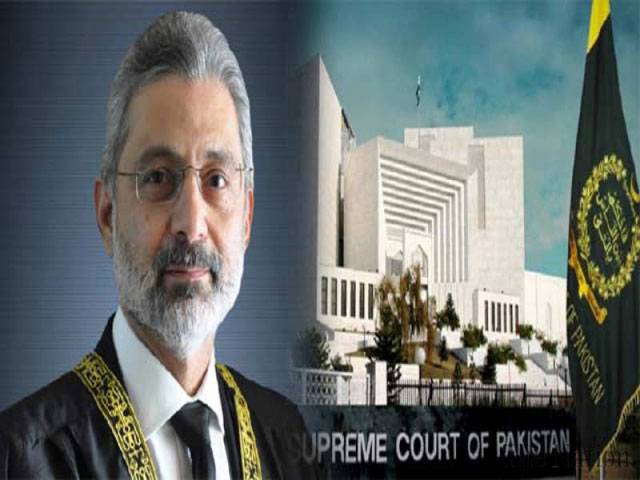ISLAMABAD - The Supreme Court (SC) on Tuesday adjourned the hearing of Justice Qazi Faez Isa’s petition, challenging the presidential reference filed against him over alleged non-disclosure of assets in his wealth statement, till Monday (November 4).
A ten-member larger bench of the apex court, headed by Justice Umar Ata Bandial and comprising Justice Maqbool Baqar, Justice Manzoor Ahmad Malik, Justice Faisal Arab, Justice Mazhar Alam Khan Miankhel, Justice Sajjad Ali Shah, Justice Syed Mansoor Ali Shah, Justice Munib Akhtar, Justice Yahya Afridi and Justice Qazi Muhammad Amin Ahmed heard the case regarding proceedings of the Supreme Judicial Council (SJC) against Justice Qazi Faez Isa.
In the reference, filed against Justice Isa, the judge has been accused of acquiring three properties in London on lease in the name of his wife and children between 2011 and 2015, but not disclosing these in wealth returns.
During the course of proceedings, Muneer A Malik, counsel for Justice Isa, said his client could submit a sealed affidavit explaining how he knew that a surveillance operation was carried out of him and his family.
Objecting to the submission of any document, Attorney General Anwar Mansoor Khan said the apex court, under Article 184 (3) of the constitution, could not record evidence.
Justice Umar Ata Bandial remarked the petitioner was trying to prove that by filing the reference against him, the executive had shown its mala fide intention.
Advocate Muneer A Malik said the federal government had never declared how information was gathered about Justice Isa and his family members’ properties.
He said the government had hired a private agency in the United Kingdom to track Justice Isa’s activities there over the past decade.
Malik also revealed that the government had attached to its reply the entire travel history of Justice Isa and his family members.
He said he could not say how the information about his client’s assets abroad was collected.
“Whether e-mails were hacked, or phones tapped, or the defence attache had obtained secret information related to the UK properties; nothing can be said with certainty,” he added.
Justice Muneeb Akhtar said mala fide intent could not be established merely on the basis of inferences.
Justice Bandial remarked that the Supreme Judicial Council (SJC) was bound to conduct a proper inquiry as it could not simply throw out a presidential reference against a judge.
Muneer A Malik said the SC had the authority to carry out an ordinary judicial review of the conduct of executive authorities in relation to a reference filed against a judge.
“The SJC’s conduct could be reviewed on the basis of the principles laid down by the top most court in the Iftikhar Chaudhry case,” he said, and added the Assets Recovery Unit continued its investigation even after filing of the presidential reference against his client.
He said after filing of the reference it was the responsibility of the SJC to collect further information.
”The president cannot submit additional documents after filing of the reference,” he argued.
SC REJECTS NAB APPEAL
The Supreme Court on Tuesday rejected NAB appeal against acquittal of accused allegedly involved in Utility Stores Cooperate Housing Society (USCHS) corruption case.
A three-member Bench of the court headed by Chief Justice Asif Saeed Khan Khosa heard the NAB case against Lahore High Court verdict.
During the course of proceedings, the Chief Justice observed that the crime occurred during the years 1991 to 96.
He observed that NAB did not exist at the time when crime occurred.
He asked how an accused can be trialled on a law that was formulated after the occurrence of crime.
He clarified that the court was not stating that the accused did not commit any crime.
He said that the same law would be applied which existed at the time of crime.
NAB Prosecutor Imran Ul Haq said that NAB initiated action in light of the court order.
The Chief Justice said that sometimes laws were made, sometimes eliminated.
He said that laws are made for others.
When that same law applies to their self, they state that it must be end, he added.
He asked whether NAB wanted to reopen 30 years old case.
The NAB prosecutor said that if the court allow the accused could be trialled under the competent law.
The Chief Justice said that prosecution could benefit from the Accountability Court decision.
The trial and high court decisions would not be obstructed in the re-investigation of the case.
The court after hearing arguments dismissed NAB appeal against the high court verdict.






